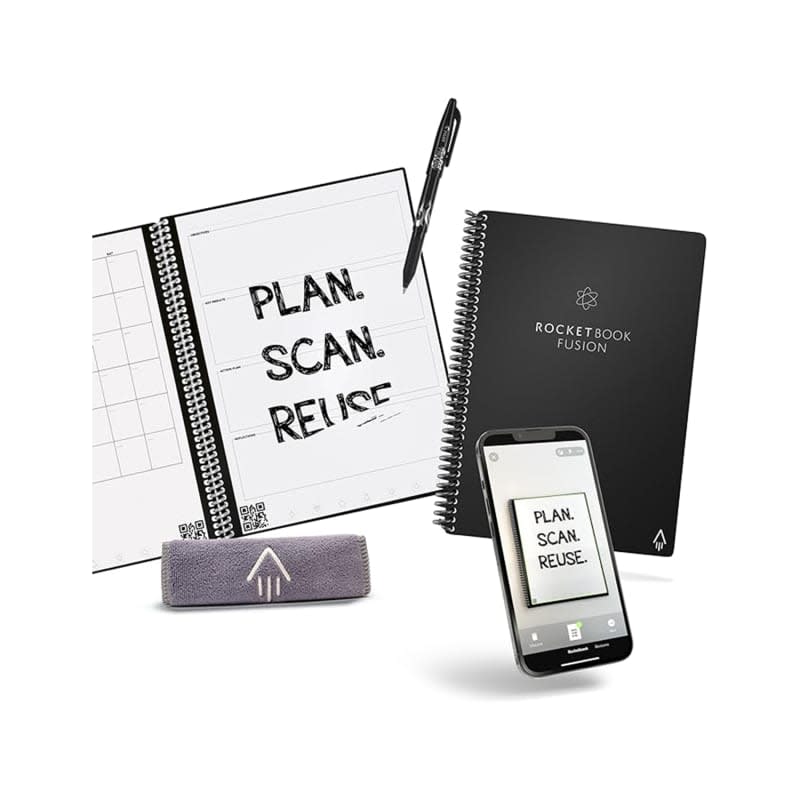I Tried an ADHD-Friendly Planner, and It Has Been Life-Changing for Me

Long before my ADHD diagnosis, I found myself stuck between a rock and a hard place. That’s because, despite my diagnosis, I’m pretty organized with my space — so much so that I began organizing professionally. There was one clutter “hot spot” I witnessed in almost every home, and that was the paper piles. It was the bane of my clients’ (and my) existence. I’ve succeeded in being as paperless as possible with things like my mail and receipts, but one issue remained: I simply loved taking a pen to paper and using lists to outwardly organize my brain.
While the notes app on my phone and digital desktop Post-its are good for note-taking or jotting down important info, I’ve been using to-do list pads with tear-off sheets or a dry-erase board to make my lists. This allows me to fulfill my desire to cross off (or erase) items without accumulating much paper clutter.
But then someone suggested I try a smart notebook called Rocketbook, which is highly recommended in ADHD communities, and, after using it almost daily for the past few months, I truly don’t know how I lived without it.
If you have ADHD and are in the market for a new planner, you might want to consider one that’s tailored to you. Here’s what to look for in an ADHD planner.
What to Look for in an ADHD Planner
In a word, simplicity. If it’s too complicated or time-consuming, it won’t hold your focus and, naturally, you’ll stop using it. I struggle with consistency of habits, so the easier something is for me, the more likely I’ll stick with it. I’m sure you can relate.
Although it shouldn’t be too involved, make sure it has the features you need such as calendars, daily to-do lists, and so on. It’s smart to choose one with some room for flexibility and creativity. I live for a good brain-dumping session, but I hate being confined to lines at times. So I find the option of blank space or bullet-like pages an important selling point.
I’m also visually stimulated and if you are as well, look for a planner that speaks to your aesthetic.
Why I Chose Rocketbook
Rocketbook is the “original reusable notebook” and was featured in the final episode of Shark Tank’s season 8. I got the Fusion notebook in the executive size. All of their products use a special pen called FriXion and can be wiped clean with a damp cloth, both of which are provided with the notebook. And there’s a free app that lets you scan notes directly to your email or multiple destinations, like Google Drive or Slack, before erasing them.
I chose Rocketbook because of its reusability. I like that I can digitally upload and organize my notes (and make them easily searchable) in case I need to refer back.
The Pros of Rocketbook
It’s eco-friendly. You’re drastically reducing paper by using reusable pages, plus the entire book is recyclable and they’re working on a pen refill subscription. So you’re not only saving your sanity by avoiding clutter hot spots and keeping your brain organized, but you’re also saving the planet.
It’s inexpensive. For a reusable and smart find, it’s pretty inexpensive. The Fusion notebook costs under $30 and the rest of the line of products can run from $18 to $55.
There’s something for everyone. There’s a variety of Rocketbooks for different purposes. I took a gamble on the Fusion because it seemed to have a little of everything — lined pages, dotted pages, task lists, weekly and monthly planners, plus a place to jot ideas and OKRs (aka goals). They sell planners geared toward teachers, students, and those into mindfulness, and even one designed with a bounded top for the lefties of the world.
It keeps you digitally organized. I love taking down work meeting notes and having them sent straight to my Google Drive with a click of a button. This also means they’re accessible from anywhere — even if you leave your notebook at home. You can tag pages and make them searchable by keywords, so finding them in the Drive is effortless.
The Cons of Rocketbook
In my experience, there aren’t many downsides to Rocketbook. Any issues I’ve come across are mostly due to my inattentiveness to instructions or tutorials that are abound in the app or on the website. For example, they provide a slew of resources and FAQs, including one that instructs you only to use the FriXion eraser in a pinch (it can damage the page’s coating) and it’s widely known (and complained about) that the ink takes 15 seconds to dry.
Another hitch I’ve found is likely caused by my messy handwriting. There’s a feature called OCR (optical character recognition) in the app that, when turned on, will transcribe your notes into a doc and email it to you. When I tested it, it did a decent job considering how illegible my notes were, but there were obvious typos and it doesn’t account for all the arrows or bullet points I tend to include. Rocketbook has tips on improving OCR, but I don’t foresee needing to use it.
Lastly, they have a shortcut to organize your notes into a specific folder once you send them to your cloud-based system. But it requires you to draw a symbol at the bottom of the page that coincides with the one you’ve set up as its destination. My drawing skills are in line with my handwriting so I’ll be skipping that step and manually sorting them instead. If you’re the type who tends to doodle, this might actually be a pro for you.
ADHD Planners to Consider Buying
If you’re looking for an ADHD planner, I highly recommend Rocketbook, but here are a few others you can consider.
Buy: Rocketbook Planner & Notebook, $28.14


